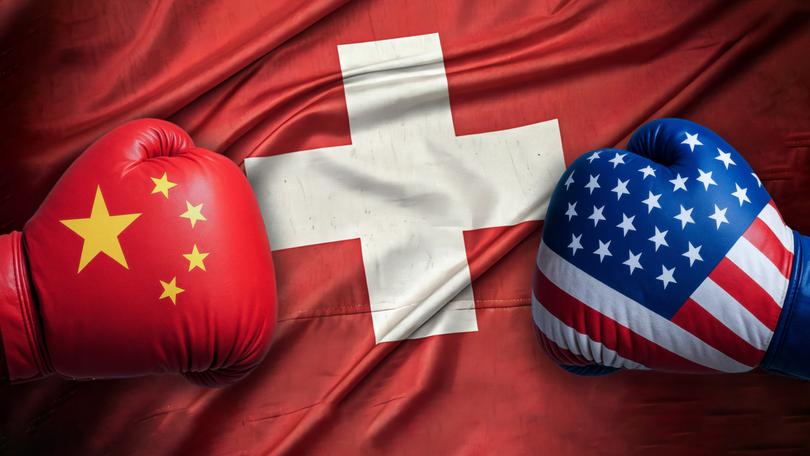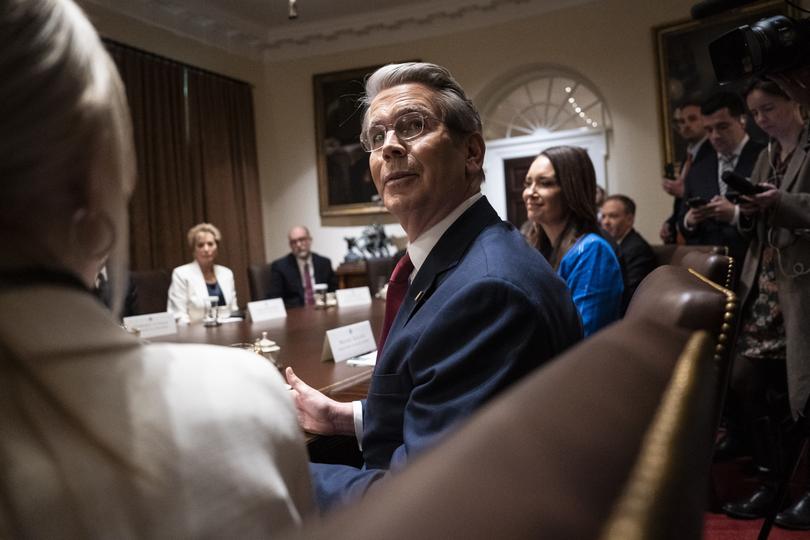US and China trade tensions thaw as high-stakes talks reopen in Switzerland
After months of punishing tariffs, US and Chinese officials meet in Switzerland, offering a glimmer of hope for two battered economies and a jittery global market.

Chinese trade negotiators will sit down with Treasury Secretary Scott Bessent and US Trade Representative Jamieson Greer in Switzerland this weekend for the first high-level talks aimed at easing tensions in their trade war.
The planned talks come after both sides, feeling the impact of tariffs that are so high they amount to an embargo, have softened their rhetoric in recent days.
China’s Commerce Ministry said Wednesday that Vice Premier He Lifeng will attend the talks in Geneva later this week.
Sign up to The Nightly's newsletters.
Get the first look at the digital newspaper, curated daily stories and breaking headlines delivered to your inbox.
By continuing you agree to our Terms and Privacy Policy.“On the basis of having fully considered global expectations, China’s interests and the appeals from US industry and consumers, China has decided to engage with the US,” the ministry said in a statement.
Mr Bessent wrote on X that, thanks to President Donald Trump, “the world has been coming to the US, and China has been the missing piece.”
“We will meet on Saturday and Sunday to discuss our shared interests. The current tariffs and trade barriers are unsustainable, but we don’t want to decouple,” he wrote.
“What we want is fair trade.”
The Office of the US Trade Representative said in a statement that Greer would meet with his Chinese counterpart “to discuss trade matters.”
Beijing has remained defiant as Mr Trump has imposed minimum tariffs of 145 per cent on Chinese goods.
It responded with its own blanket 125 per cent levies and restricted exports of key raw materials needed by US manufacturers to produce military drones, consumer electronics and medicines.
Chinese officials have repeatedly pledged to “fight to the end” and called for the US to remove all tariffs before negotiations could begin.
But Beijing softened that hard-line stance recently after Mr Trump spoke about his hopes of making a deal with Chinese leader Xi Jinping, even as it has continued to underscore that China is the aggrieved party and to project itself as a responsible power to the rest of the world.
“Whether it is fighting or talking, China’s determination to safeguard its own development interests will not change, nor will its position and goal of defending international fairness and justice,” the Commerce Ministry statement said. “If the United States wants to solve the problem through negotiations, it must face up to the serious negative impact of unilateral tariff measures on itself and the world.”

Analysts were quick to dampen expectations of a breakthrough.
“These should probably be seen as pre-negotiations,” said Scott Kennedy, a China expert at the Centre for Strategic and International Studies.
“Both sides don’t want to show weakness. Both sides want to frame the negotiations in ways that benefit themselves relative to the other side. Both have felt some pain, but they also know the other side is feeling some pain.”
Chinese experts said that it was still up to the US to show it was serious about easing tensions.
“The key is whether the US is willing to first correct its stance on tariffs,” said He Weiwen, a retired Chinese diplomat who is now a senior fellow at the Centre for China and Globalisation, a Beijing-based think tank.
“If that willingness is not there, there can’t be substantive results.”
Even so, the start of talks will be a relief for the global economy and financial markets that have been roiled by the prospect of trade between the world’s largest manufacturer and the world’s largest consumer grinding to a halt.
Even a modest de-escalation and the prospect of a partial deal would amount to great news for the two economies, said Eswar Prasad, a professor at Cornell University and a former senior China official at the International Monetary Fund.
“The escalating and increasingly bitter trade war between the US and China was fostering an unfavourable trade environment around the world and stoking economic uncertainty,” he said.
China’s tough retaliations and often bellicose rhetoric - vowing to “never kneel down” to US pressure and quoting Mao Zedong, the founder of Communist China, on how to wage “protracted war” - had dimmed hopes of talks with the Trump Administration.
Mr Jinping, the most powerful Chinese leader in decades, was especially unlikely to enter direct talks until lower-level officials had hammered out the details and received assurances that Mr Trump would negotiate in good faith, experts on Chinese politics have said.
The decision to sit down for a meeting before the Trump Administration has substantively lowered tariffs on Chinese goods - one of Beijing’s stated prerequisites for talks - suggests China is concerned about pressure on the economy, said Shi Yinhong, an international relations scholar at Renmin University in Beijing.
US-China trade tensions may ease, Mr Yinhong said, but the two sides are still far away from even a limited agreement like the “phase one” trade deal of Mr Trump’s first term.
“If the outcome is to continue talks, then that itself will be a substantive,” he said.
Although the Chinese economy grew at a surprisingly robust annual rate of 5.4 per cent in the first three months of this year, it has been struggling to shake off a prolonged property slump, weak consumption and high unemployment.
The trade war has already started to hit manufacturing and international trade, which had been among the strongest-performing parts of the economy.
Export orders in April hit the lowest level since the coronavirus pandemic.
Beijing has so far held fire on unleashing other measures to stimulate growth, preferring to quietly make tariff exemptions and gradually dole out support as needed to cushion the economic blow.
Officials took further steps to protect exporters and support the housing market on Wednesday.
The Chinese central bank made it cheaper for commercial banks to borrow money and announced cuts to the amount of cash they must keep in reserve to spur lending.
It also slashed interest rates on mortgages in a bid to encourage people to buy homes.
Internationally, Beijing has been trying - with some success - to find common cause with trading partners concerned about Mr Trump’s tariffs.
Talks with the European Union made progress last week when China agreed to lift sanctions on European parliamentarians, removing one obstacle to negotiations toward a mutual investment agreement.
Mr Jinping called on the EU to work with China to “oppose unilateral bullying” and promote “inclusive economic globalisation,” in a speech marking 50 years of diplomatic ties on Tuesday.
In announcing talks, Beijing again portrayed itself as being a responsible defender of fair trade, but warned that it would not accept negotiations as a front for further US pressure.
“If they say one thing and do another, or even use talks as cover for continued coercion and blackmail, China will never agree,” the Commerce Ministry said.
According to Mr Kennedy, the CSIS expert, the lack of clear objectives means there is a risk that talks will devolve into a shouting match with “both sides restating why they feel like they’re the victim.”
Even worse, he added, talks could end “with some sort of escalation.”
- - -
© 2025 , The Washington Post
